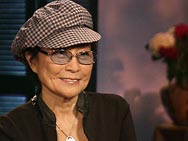Just recently, Rolling Stone Magazine turned 40 years old. This icon of Rock and Roll over the years has covered not only individual musicians, but often their politics as well. The rise of Rock and Roll in the sixties greatly mirrored the political realm which was mired in war and the fight for civil rights. In the history of the Rolling Stone, no one has graced the front cover of that magazine more times than John Lennon. And at the same time, no one had more of an impact on the anti-war movement than John Lennon. This picture of John and Yoko naked is by far the most contraversial of those covers. Note: the caption below reads, "And they were naked, and they were not ashamed".

As a child of the sixties, I remember well the first US appearance on television of the Beatles. It was on the Ed Sullivan Show, airing on a Sunday evening. Although the Beatles had already had a head start in their home country, the anticipation of their appearance on this nationally televised program was a HUGE thing. Their first songs were those "old Beatles" songs like "I Want to Hold Your Hand", the sappy teeny-bopper sort of song which got their foot in the door. But as time moved forward, the Beatles, and in particular, John Lennon, grew more political. Here was a musician, using his talents as a music and lyrics writer to "teach" the world what he wanted them to hear. Who can forget "Imagine" or "Give Peace A Chance", two songs that dared to challenge the establishment with a different vision for the world. So while his music was inspiring Americans to rise up against the establishment and his music became the mantra of the times, he was also seen as one of the most dangerous subversive threats to the "powers that be" Below is the recently released documentary, "The US vs. John Lennon".
Happy Birthday Rolling Stone and may the message of John Lennon NEVER be silenced.
EXCLUSIVE: Yoko Ono on John Lennon and the FBI
John Lennon's Widow Talks With Jonathan Karl About Their 'Threat' to U.S. Government

By JONATHAN KARL
Sept. 5, 2006
John Lennon's perceived "threat" to the U.S. government is the highlight of a new film that documents his transformation from pop idol to political activist and offers a fresh look at this former Beatle's career.
"The U.S. vs. John Lennon" will be released later this month. Yoko Ono cooperated with the filmmakers, opening her archives of rarely seen footage of the couple's fight for peace.
"One thing that brought us together was the fact that both of us were rebels in so many ways," she said.
And that's something he didn't always share with his bandmates, who were reluctant to join Lennon as he spoke out against the Vietnam War, said Ono.
"He is the only one who really wanted to do something about it when he was a Beatle," Ono explained.
Star Watched by the FBI
Lennon's rebelliousness may have come at a price. In the 1970s, Lennon was convinced that government agents were watching him. As it turns out, he was right.
Almost 20 years after his death, the government released the FBI file on Lennon, which included nearly 300 pages of text. One document that went from the FBI to the CIA reports that Lennon planned to take part in a protest at the 1972 Republican National Convention.
South Carolina Sen. Strom Thurmond seized on that, suggesting to President Nixon's attorney general that Lennon's visa be terminated.
A few weeks later, Lennon was given 30 days to leave the country and was notified that his visa had been terminated because of an old drug arrest in England.
"I think that the world really loved the Beatles for being charming and sweet," Ono said. "But some people did resent the fact that they were no more the sweet, nice, charming boys."
Ono and Lennon did not want to leave the United States, and a legal battle ensued.
In 1976, after the end of the Vietnam War and the Watergate scandal, Lennon won.
The judge in the case wrote that the British singer's battle to stay in the United States was a "testimony to his faith in the American dream."
No comments:
Post a Comment